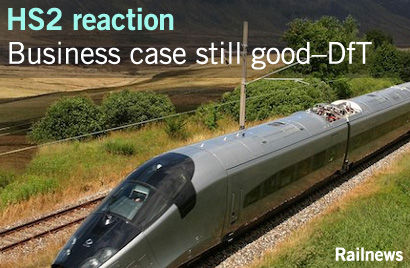THERE HAS been a welcome in many quarters for the High Speed 2 plans announced by transport secretary Justine Greening today, but anti-HS2 campaigners are vowing to continue their opposition to the £32 billion project, which will eventually link London with Birmingham, Manchester and Leeds with trains travelling at up to 400km/h.
The first section between London and Birmingham is to open in 2026, with the branches of the 'Y', onwards to Manchester and Leeds via the East Midlands, due to follow in 2033. A formal consultation on the second phase routes will begin in early 2014, with a final route chosen by the end of that year.
Although the London-Birmingham route has now been decided, following last year's consultation, it has been revealed that there have been some changes to the plans over the past few months, in a bid to take account of some of the environmentally-based opposition.
The Department for Transport said around 36km of the route will now be in tunnel or green tunnel – compared to 23km at the consultation stage – and another 94km will be in cuttings. A further 64km will be on viaducts or embankments – a reduction of 16km from the consultation route.
ATOC chief executive Michael Roberts said: “HS2 is a vote of confidence in the railways and recognition of the vital role the industry has to play in supporting jobs and driving sustainable economic growth.
“HS2 would help to alleviate the capacity crunch on many of our major rail corridors and offer the prospect of shorter journey times between London and other major English cities. It would also allow for faster and more frequent local services in areas between London and Birmingham, as space is freed up on existing lines.
“By deploying the best of British design and engineering in the construction of the high speed line in Kent we struck the right balance between national and local interest – we can do the same again with HS2.”
The Liberal Democrats said the announcement was 'excellent news'. Julian Huppert, who is co-chair of the Liberal Democrat Parliamentary Party Committee on Transport, said: " It will make life easier for passengers and bring huge benefits to the country as a whole, generating economic growth and creating jobs.
“This project will also improve national capacity for rail freight. Finally rail can be seen as a realistic alternative to the road for moving freight. This has the potential to take heavy goods vehicles off our major routes. This project will also improve connections further north and up to Scotland, so it is important that the Government starts planning for the next phases soon."
Not surprisingly. the announcement was also greeted warmly by groups who have been campaigning in favour of a domestic High Speed network.
Key figures from the regional consortium Go-HS2, which include Birmingham City Council, transport authority Centro, Birmingham Chamber,
NEC Group, Birmingham Airport and Marketing Birmingham, said the go-ahead for the project meant thousands of jobs and a multi-billion pound boost for the West Midlands economy.
Mike Whitby, who is leader of Birmingham City Council, said: “The go-ahead for HS2 provides probably the single most important opportunity for economic growth in this region for generations."
The RMT union sounded a warning about what it feared could be some of the implications, and called for complete public ownership of the new lines.
The union's general secretary Bob Crow said: "No one has fought harder for the investment and modernisation required to drag the UK’s railways out of the slow lane than RMT and development of high speed links must be a key component of our rail plans. However, any attempt by the Government to pay for these developments by cutting jobs, services and investment elsewhere in the system, along the lines set out in the McNulty rail review, will meet with the stiffest resistance from RMT.
"RMT is also demanding that High Speed Two be built, owned and operated in the public sector free from the greed and profiteering of the private rail companies."
The DfT said the business case was still good, despite the effects of the economic crisis, and put the cost of the project at £32.7 billion. It expected the complete 'Y' shaped network to generate benefits of £47billion and fare revenues of up to £34 billion over 60 years.
But opponents are continuing to challenge the government's economic argument, suggesting the costs will be greater while the economic benefits will be lower than forecast, and that the business case for HS2 is too optimistic about future growth in demand for long-dtstance rail travel.
Emma Boon of the TaxPayers' Alliance said: "High Speed Rail will leave generations of ordinary taxpayers paying for a train set that will mostly be used by the rich. We can't afford £32 billion for this project right now. The business case is fundamentally flawed and the Government have vastly inflated the benefits of HSR to the regional economy while hiding the true costs of the project."
Joe Rukin of Stop HS2 agreed. He said: "There is no business case, no environmental case and there is no money to pay for it. It's a white elephant of monumental proportions and you could deliver more benefits to more people more quickly for less money by investing in the current rail infrastructure."


